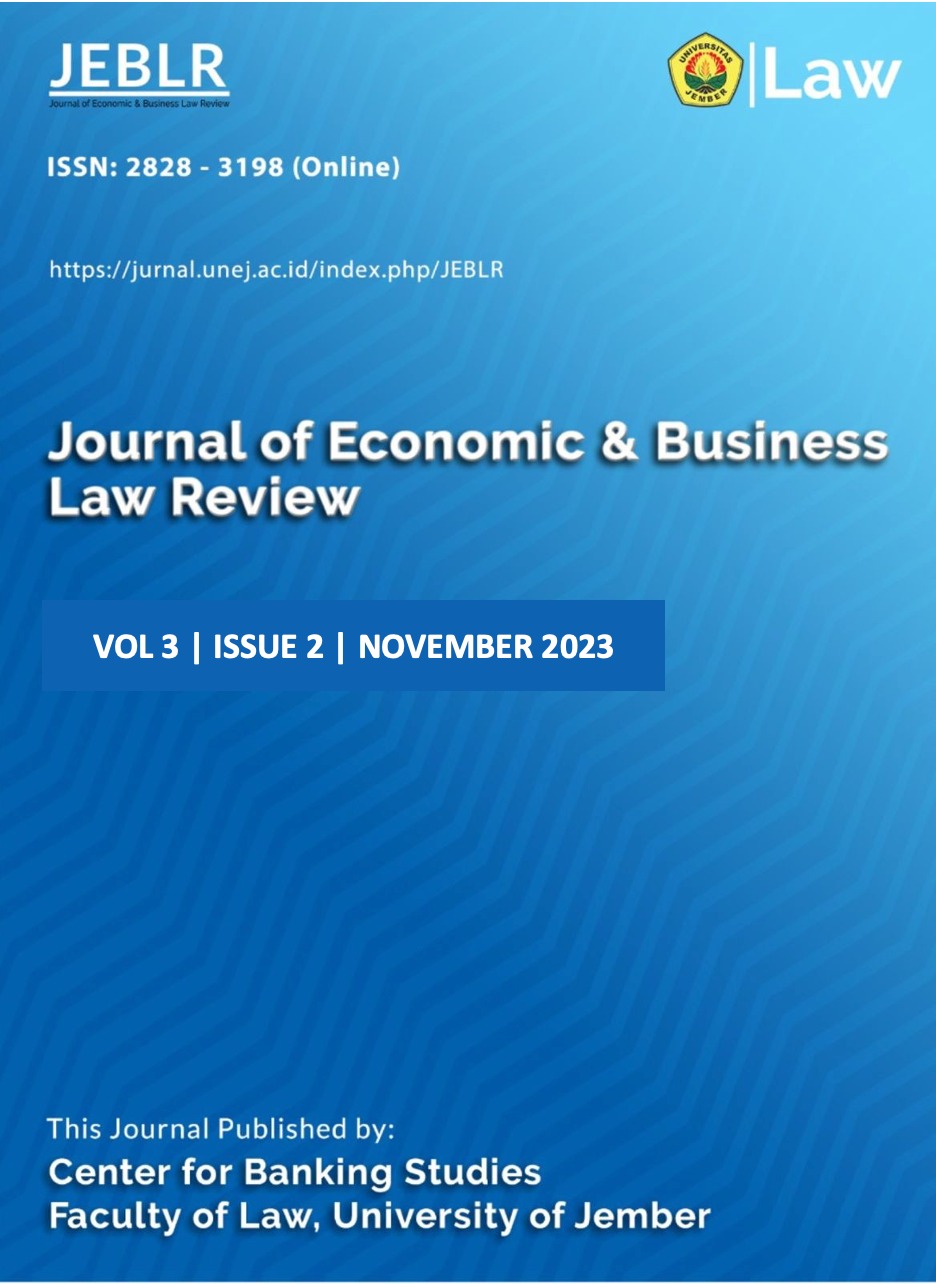The Role of International Organizations in the Globalization of the Economy and its Impact on National Sovereignty
DOI:
https://doi.org/10.19184/jeblr.v3i2.24446Keywords:
WTO, National Sovereignty, Globalization, International OrganizationsAbstract
The end of World War II was the beginning of expanding organized international relations and the growth of relations between different nations in all areas, especially the trade of goods and services. The spread of these connections led to a phenomenon called globalization. Globalization is tied to freedom of trade and competition. Its requirements so far have been that governments have been forced to largely change their laws, regulations, policies, and policies to enter this field and to accept various international requirements and commitments. The activities of international organizations, both global and regional, have intensified this trend. Globalization has changed the definitive boundary between domestic and international affairs, and the process of globalization has transformed the traditional concepts and structure of governance and the relationship between governance and law. The territorial jurisdiction of countries has been severely pressured by the globalization of the economy and social relations. In this transformation, the authority of all countries, both strong and weak, has been lost due to integration into the world economy.
Downloads
References
Bruce, Nancy,Garrett,Geoffreym, and Bruce Kogut, The International Monetary Fund and Global Spread of Privatization, IMF, Staff Papers, Vol.51, No.2,
Drahos,Peter and John Brathwaite, “Intellectual Property Corporate Strategy, Globalization, TRIPS in Contextâ€, 20 WIS, INT’LLJ, p. 457, (2002).
Giddens, Anthony, The Consequences Of Modernity, Stanford University Press< Stanford, CT. 1990
Goldblatt, David, David Held and Antony McGraw and Jonathan Perraton, Global, Local political, Vol.22, No.3, (July- September1997)
Glusky, Sara, Globalization Challenge Initiative, IMF Forces Water Privatization on Poor Countries Grinin “Modern Productive Forces and the Problems of National Sovereignty
Haider A. Khan, Making a Rules-Based Trading Regime Work: Globalization and the WTO Dispute Settlement Industrialization and growth in the World Economy†No. 173, UNCTAD/DSGDP/113, March 1996
Mechanism,Electroniccopyavailableat:http://ssrn.com/abstract=995933( visiting date:92/2/10)
Jayasriya, Lannishka,Global Legal Studies Journal, Vol.6.
Julia La Qin, Trade, Investment and Beyond: The Impact of WTO Accession on China’s Legal Systems The China Quarterly, 191, September 2007
K.Sell. Susan. “What Role for Humanitarian Intellectual Property ? The Globalization of Property Rights “(MINN). L. SCI&Tech. Vol.6 .1p. 198..
MacComick,Neil; “Democracy, Subsidiary and Citizenship in the European Commonwealth†16,L & PHIL, 31(1997).
Maskus, Keith E. , Intellectual Property Rights in the Global Economy, the Economics of Intellectual Property Rights and Globalization Matsushita Mitsuo, Basic Principles of the WTO and the Role of Competition Policy, Washington University Global Studies Law Review, Volume 3, 2004.
Meltzer, Joshua, State Sovereignty and Legitimacy of the WTO,U.Pa.J.Int`Lecon.L., vol.26.
Milner, Helen V., Globalization, Development and International Institutions: Normative and Positive Perspectives, Review Essay, December 2005Vol. 3, No. 4.
Moschini, GianCarlo, Intellectual Property Rights and the World Trade Organization: Retrospect and Prospects, Agricultural Policy Reform and the WTO: Where Are We Heading?, Edward Elgar Publishing.
Naoshi Doi and Hiroshi Ohashi, Empirical Analysis of the National Treatment Obligation Under the WTO: The Case of Japanese ShochuJanuary 2012.
Nancy Brune, Geoffrey Garrett, and Bruce Kogut, The International Monetary Fund and the Global Spread of Privatization, IMF Staff Paper, Vol.51,No.2, International Monetary Fund, 2004.
Nancy,Alexander, The Roles of The IMF, the World Bank, the WTO in Liberalization and Privatization of the Water ServicesSector,October212005,http://www.ServicesForAll.org,(visiting date:5/2/2013).
Nayef R.F. Al-Rodhan, Historical Milestones of Globalization, Geneva Centre for Security Policy, June 19, 2006.
Paul Bairoch and Richard Kozul – Wright, “Globalization Myths: Some historical Reflections on Integration,Ratti Case 148/ 78 [1979] ECR 1629 and Marshall Case 152/ 84 [1986] ECR 723.
Richard Richard Bellamy & Dario Castiglione, Building the Union, The Nature of Sovereignty in the Political Architecture of Europe, 16, LPHIL,(1997).
Shahzad Akbar khan,Intellectual Property Law and Globalization.p.1http://www.Supremecourt.gov.pk/ijc/Articles/19/1.pdf. (Visiting date:5/2/2013).
Shrybman,Steven, The First WTO Case to consider issue of copy write protection involved a challenge by the EC to certain provisions of the US Copy write Act establishing certain limitations on the exclusive rights of copywrite holder, Aug. 2000, mht.
Strange, Susan, The Retreate of the State, The Diffusion of Power in the World Economy, (1996).
Wang, Guigo, The Impact of Globalization on State Sovereignty, Chinese Journal of International Law, 2004, 3/2.
Walraven, Katherine, Looking for Facts in the GATS Attack: Impacts on Social Service Sovereignty, available at: http://www.princeton.edu/jpia/past-issues-1/2006/8.pdf, visited on 2013-07-17 .















